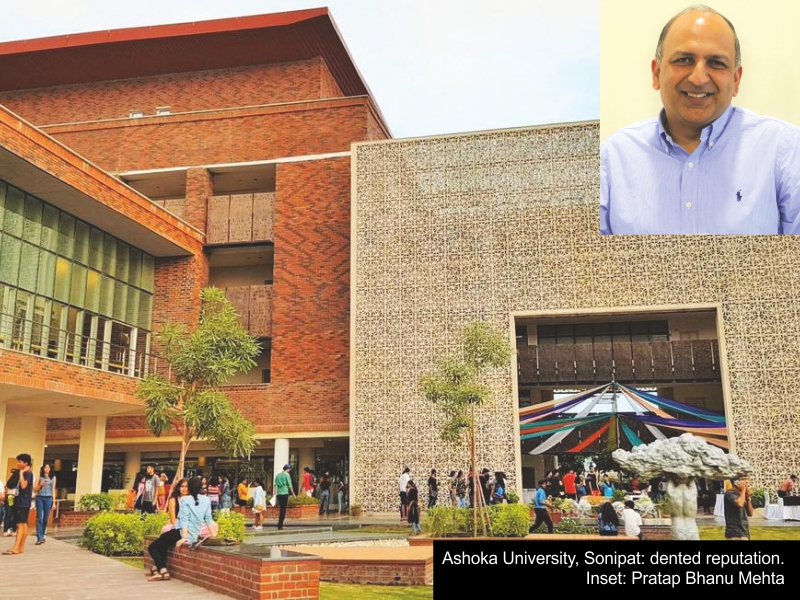
Avtar Nehru (Delhi)
The resignation of prof. Pratap Bhanu Mehta from the political science faculty of Ashoka University (AU) on March 15, has stirred the academy in India and abroad and shaken the carefully curated reputation of this seven-year-old university positioned as the country’s first wholly — American Ivy league-style — liberal arts university.
When Mehta was appointed vice chancellor of this institution in 2017 and two years later demoted himself to mere faculty, he brought formidable scholarship (alum of Oxford (UK) and Princeton (USA), teaching experience at Harvard, and as president of Delhi-based think tank Centre for Policy Research), to AU. Perhaps more important, as consulting editor and weekly columnist of the multi-editions Indian Express, Mehta has established a reputation as the country’s foremost anti-establishment public intellectual.
In his resignation letter, Prof. Mehta wrote: “After a meeting with founders, it has become abundantly clear to me that my association with the university may be considered a political liability. My public writing in support of a politics that tries to honour constitutional values of freedom and equal respect for all citizens, is perceived to carry risks for the university. In the interests of the university, I resign.”
Two days after Indian Express broke the story of Mehta’s resignation, Arvind Subramanian, former chief economic advisor (2014-2017) of the incumbent BJP/NDA government at the Centre and professor in AU’s department of economics, also put in his papers in protest. These high-profile resignations not only hogged national and international media headlines but have also sparked a fierce debate on academic freedom and university autonomy in contemporary India, where the BJP leadership is quick to classify all criticism of the government as anti-national, and to slap sedition charges on critics.
Former Reserve Bank of India governor Raghuram Rajan was among the first to react. “Ashoka’s founders have succumbed to outside pressure to get rid of a troublesome critic. Free speech is the soul of a great university. The founders have bartered away its soul,” says Rajan.
Widespread criticism of the university’s administration has undoubtedly dented the reputation of this highly respected varsity ranked India’s #3 private university in the EducationWorld India Higher Education Rankings 2020-21, and particularly of its trustees and administration. The faculty and students who hitherto regarded themselves as a privileged elite, are also up in arms. Ninety faculty dons of the university in a letter to the university vice chancellor Malabika Sarkar, wrote: “We are greatly troubled by this scenario. Even more troubling is the possibility that our university may have acceded to pressure to remove Prof. Mehta or to request, and accept, his resignation.”
Students — half of them on varying need-based scholarships — under the aegis of its Student Government, have addressed a three-point demand — public acknowledgement by the founders of what Prof. Mehta has indicated; an open meeting with faculty and students and divesting administrative powers and roles from founders of university to elected representatives of faculty and vice chancellor. According to latest reports, Sarkar has given a written assurance to the Student Government stating that its nominee would henceforth be invited to all meetings of the board of management.
Caught in a maelstrom, the AU administration has had to eat humble pie and admit to “lapses in institutional processes”. “We acknowledge that there have been some lapses in institutional processes which we will work to rectify in consultation with all stakeholders. This will reaffirm our commitment to academic autonomy and freedom which have always been at the core of the Ashoka University ideals,” says a joint statement signed by chancellor Rudrangshu Mukherjee, Sarkar, chairman of the board of trustees (Ashish Dhawan) and significantly, by Mehta and Arvind Subramanian.
According to well-informed monitors of India’s higher education system these high-profile resignations from this torch-bearer private liberal arts university are likely to make the growing tribe of ‘give back’ philanthropists think twice about promoting private universities.
Nevertheless, this controversy has highlighted several important university governance issues. One of them is for clear definition of the roles of promoter-trustees, vice chancellor and institutional management.
Also read: Arvind Subramanian resigns as professor from Ashoka University